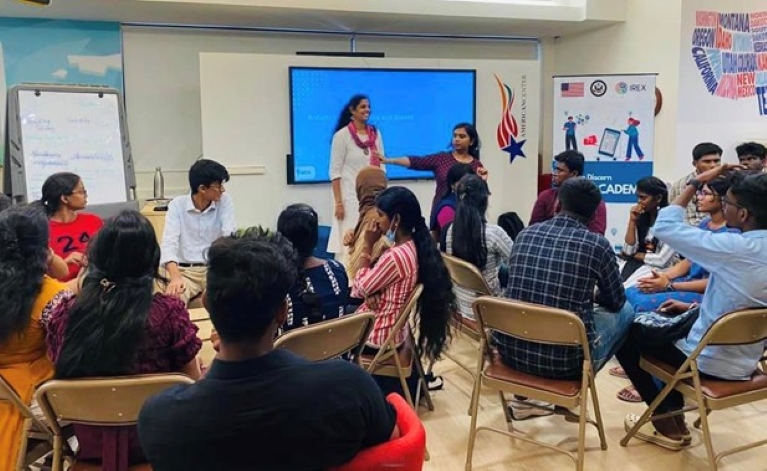L2D India trainers utilize brave space approach to enhance media literacy for youth in India

IREX’s Learn to Discern India Academy (L2D-IA), developed and launched a series of online media literacy courses to boost young Indians’ resilience information manipulation. Through the program, youth from five cities across India gained essential skills to effectively navigate today’s information environment. They improved their ability to differentiate facts from opinions by analyzing and evaluating information, increased their sense of control over their own information consumption habits, and improved their English language skills.
The L2D-IA program, funded by the U.S. Embassy in New Delhi, equips Indian youth with the skills to become discerning consumers of news and information and critically engage with media. L2D-IA reached 198 youth leaders in New Delhi, Chennai, Hyderabad, Kolkata, and Mumbai through the program’s online course on media literacy and accompanying peer learning exchanges, where youth worked together to produce creative group projects promoting media literacy.
To facilitate an open environment for learning and discussion, L2D-IA’s master trainers led in-person and virtual sessions with their local participant cohorts. In Chennai, L2D India’s master trainers, Kavya and Divya used a brave space approach built on trust and collaboration to help the Chennai cohort learn how to disagree respectfully, speak with conviction while keeping one’s emotions in check, respect different viewpoints and experiences, and amplify each other’s strengths rather than target each other’s weaknesses.
Brave spaces are spaces that foster an inclusive environment and where tolerance is essential to make room for diverse contributions and perspectives can be challenged respectfully. Brave spaces are a shift from the concept of a “safe space,” and place stronger emphasis on the bravery required of participants to speak up and share their opinions, but also to sit back and listen to views and opinions that differ from one’s own.
Since the 51-person Chennai cohort is one of the program’s most diverse in terms of both socio-economic and academic backgrounds, creating a brave space was necessary. These spaces fostered participants critical thinking skills and helped give them the courage to ask questions, share their experiences candidly, and challenges others’ ideas and opinions constructively despite their differences. In turn, this improved participants’ leadership and English language skills.
Through this media literacy program, we have tried to enable our participants to develop their critical thinking and communication skills and sought to instill confidence with empathy. Helping build a cohort of media champs who are not only critical thinkers but are also kind and empathetic, who can communicate gently even when they disagree, who, instead of competing against each other, prioritize collaboration and teamwork: this has been one of the most important successes for us.” – Chennai Master Trainers
Crafting an individualized approach
From the start of the program, master trainer Kavya took the time to get to know each cohort member individually, understand their strengths and their doubts, and help them come into their own, empowering participants who lacked confidence to participate and share their thoughts more actively. With master trainer support, participants have all made improvements in areas they considered to be their weaknesses. Participants who were anxious about public speaking, for example, shared that they gained confidence in their abilities through the program.
I am from a small town, and I am sitting here in the US Embassy today. I am a commerce student, I thought I did not have a lot to add to the discussions, but I feel seen and heard here. And I am putting in the work and learning so much.” – Guhan, L2D India Academy participant

Modeling a safe space for inquiry and sharing
During the coaching sessions for the master trainers, IREX staff shared the brave space training principles, instructing the trainers utilizing the brave space approach. To provide program participants with the same experience, Kavya and Divya encouraged participants to ask questions about the information they consumed – even if it came from master trainers themselves. This was key in creating an inclusive culture that values vulnerability and where there are no wrong answers, open discussion is truly welcome, and there are no consequences for disagreeing with “authority figures” as there may be in other spaces.
From childhood I thought that trainers like Kavya and Divya only exist in the West, who are polite and will not get mad at you and will be supporting you both course-wise and also personally. [They] understand what we are going through… I love this about [them] and I definitely feel supported and valued.” – Sathya, L2D India Academy participant
When working with participants, Kavya and Divya created space for all participants – no matter how shy – to share their experiences and express their opinions, answering questions with compassion and without judgment, and encouraging respectful discussions, particularly surrounding challenging topics.
Kavya and Divya’s success in creating a brave space allowed L2D-IA participants to focus on developing their media and information literacy skills and unleashing their creativity to spread the message in their own communities.